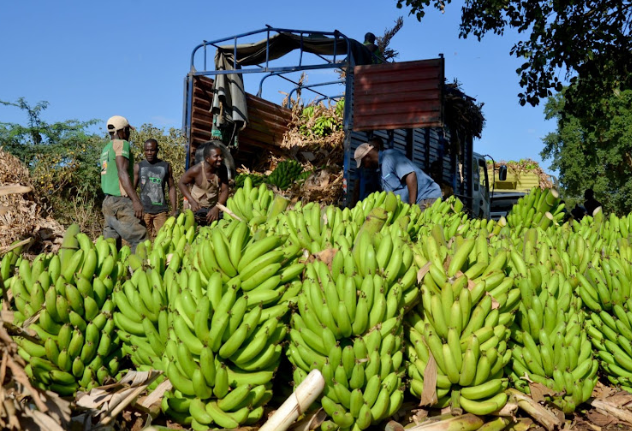The UN has introduced a new initiative aimed at helping farmers in Laikipia and Nyamira counties reduce post-harvest losses in the banana and livestock value chains. The project, titled Circular Economy in County Aggregation and Industrialisation Parks, will offer farmers expert guidance and practical solutions to tackle post-harvest losses, which currently account for 40% of their produce.
Asha Kerubo, a banana farmer from Nyamira County, noted that value addition and effective waste management have significantly reduced their losses from 46% to 15%.
“We’ve discovered that waste can be a valuable resource. For example, when we process banana stems, we extract fibers to make baskets, which provide us with additional income. We hope that with UNIDO’s support, we can achieve zero post-harvest losses in our county,” she said.
Agriculture secretary Collins Marangu said the project seeks to transform food systems by engaging the youth and embracing global trends.
Marangu noted pressures of global population growth, climate change, urbanisation and resource depletion on food production and consumption.
“Kenya’s population is nearing 57 million, with 75 per cent under 35. The traditional linear food production model of extract, use, discard, is increasingly unsustainable. This take-make-waste approach results in significant environmental degradation, economic inefficiencies and social inequalities,” he said.
The circular economy focuses on creating closed-loop systems where agricultural products are reused, repurposed and recycled, reducing waste and maximising value.
Marangu said aggregation is crucial for transforming food systems and enhancing circularity.
He said small-scale farmers often face inefficiencies due to fragmented production.
“Aggregation can address these challenges by pooling resources, knowledge and infrastructure,” Marangu said.
“For young people, aggregation offers an exciting opportunity. Digital platforms and cooperative models allow them to connect, share resources and engage in sustainable food production, fostering community and shared responsibility.”
Industrialization has boosted productivity and enhanced food security. There has been a noticeable shift in youth preferences from traditional staples like ugali to ready-to-eat foods. This change demands innovation in food processing and packaging to address nutritional needs, create job opportunities, and transform food systems.
FAO representative in Kenya, Tipo Nabenyi, explained that the project, funded by the Government of Norway with $1.5 million (Sh193.5 million), is a collaborative effort involving FAO, UNIDO, and IOM.
“The project aims to produce food in ways that protect and regenerate nature, enhance biodiversity and restore ecosystems. It will address food loss and waste and convert materials that would otherwise be wasted,” she said.
Tipo said the significant financial investment needed to transform the global agrifood system to be more resilient, nutritious, inclusive and net-zero, is estimated at about $500 billion annually over the next decade.
“Investing in this transformation not only offers substantial financial returns but also positions you as leaders in tackling global challenges such as food security and climate change while fostering sustainable growth and innovation in the agrifood sector,” she said.
Tally Einav, UNIDO country representative said they will develop tailored guidelines for the banana and livestock value chains to integrate circularity.
“We will provide training and technical support to enhance the capacities of policymakers and businesses and use our global and local investor network to attract targeted investors to these value chains,” she said.



